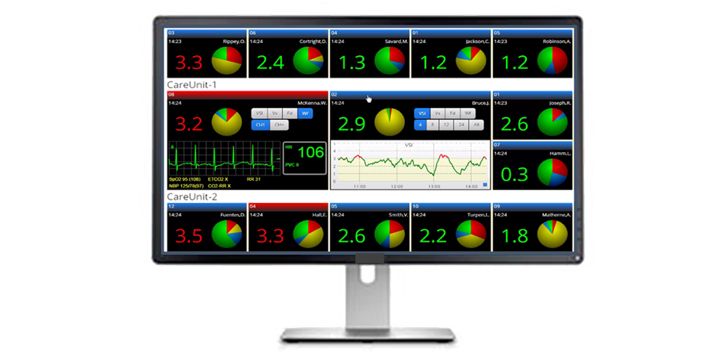Predictive Patient Surveillance System Receives FDA Clearance
Excel Medical calls the combined approval of a predictive algorithm and delivery platform "the first of its kind."

(WAVE Clinical Platform. Image courtesy Excel Medical.)
Florida-based medical device maker Excel Medical today announced that its WAVE Clinical Platform has received clearance from the FDA. The system allows for constant patient monitoring, analyzed and delivered to hospital staff in real time, to prevent unexpected deaths in the hospital.
Phase 1, 2, and 3 studies run at the University of Pittsburgh Medical Center (UPMC) were factored into the FDA’s decision. According to the research, UPMC's control cohort had 6 unexpected deaths, while the trial cohort had 0.
The WAVE platform incorporates an algorithm called the Visensia Safety Index, developed by Oxford University spinoff OBS Medical. Excel licenses the algorithm, which was approved for use in 2011. The new clearance from the regulatory agency, granted last week, is for the algorithm used in tandem with Excel Medical’s platform.
The application takes data from patient physiological monitoring systems and electronic medical records (EMR). It stores and manages the data and runs analytics on it, presenting its findings in realtime, either through the EMR system, central monitor, or a smartphone and tablet app.
There are 400,000 deaths per year from preventable deterioration, Excel Medical’s Chief Strategy Officer Mary Baum told Healthcare Analytics News™ in an interview. She said the number was equivalent to 2 airliners colliding every day of the year.
“It is like air traffic control. We’re not trying to do everything, but we’re trying to keep the planes from colliding,” Baum said.
Speaking to HCA News, Excel Medical General Manager Lance Burton said that the system is EMR vendor-agnostic, though the company has an existing partnership with Epic Systems that allows for particularly tight integration that provider's technology.
At the moment, the platform focuses on population health within the hospital walls, but Burton suggested that his company may expand its focus in the long-term.
“In the future, we’ll be looking outside of the hospital. It makes logical sense, since CMS is focused on more of a longitudinal view of the patient and the responsibility of healthcare providers and hospitals,” he said. “When looking at 30-day hospital readmissions, ICU readmissions, code events, and rapid response team activations, this platform’s going to be a real powerful tool to address those problems.”
Burton added that the platform, and its FDA clearance, were important to Excel Medical. The company says it's the first time an algorithm and delivery platform of its type have been cleared by the agency.
In addition to expanding its purview to outside of the health system, Burton mentioned that the company would seek further integration with wearable devices that provide biometric information.
“Everything we do as an organization aligns toward and supports the goal of eradicating unexpected deaths in hospitals,” he said in an official statement. “People may say zero unexpected deaths is unattainable. We say anything other than zero is unconscionable.”
“I just think there’s so much ‘blah blah’ out there about predictive analytics. But this is real-time, this is actionable, and this can save lives,” Baum said.
Related Coverage:The Digitized, Cloud-Dependent "Smart Hospitals" of the FutureAdoption of Analytics for Value-Based Care Remains Widely UnevenMayo's Nilay Shah: Concerns About Predictive Analytics